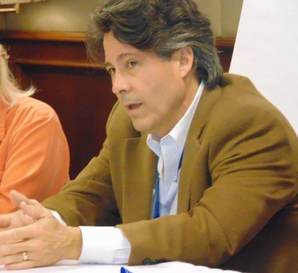If you’re attending the PNWA conference in Seattle this week, I hope you’re registered for the master class with Robert Dugoni.
Of course, it's a chance to rub elbows with an award-winning novelist and learn his tricks of the trade. But you may also be treated to Film 101 like I was a few month’s ago when I enrolled in Dugoni’s master class held at the Chanticleer Author’s Conference in Bellingham. With references to flicks such as The Green Mile, The Game, Blood Diamond, The Godfather and Jaws, Dugoni invoked modern film and classics alike. Let’s face it: a good narrative can unfold on screen or in a book, and Dugoni knows the recipe – he’s a New York Times Best-Selling author. In May, he released “In the Clearing,” the third title in his successful Tracy Crosswhite detective series.
"Let’s face it: a good narrative can unfold on screen or in a book, and Dugoni knows the recipe"
Afterward, we would head to our all-night diner on West 4th Street to deconstruct plot and theme. Todd would get a coffee and toasted blueberry muffin; I, the cole slaw. Crammed into a booth with our ragged legal pad between us, we would discuss the “McGuffin” and how movies and novels share some of the basic tenets of good storytelling.
Find out: what is a "McGuffin"?
| Back to Dugoni's master class, we learn Rule Number One: “Create tension on every page." Look at Dorothy in The Wizard of Oz (which, of course, is the 1939 film adaptation of the Frank Baum book published in 1900), a protagonist who has goals throughout the story that are both public and private. Dorothy’s quest for the ruby slippers will get her home to be with ailing Aunti Em (personal goal), Dugoni says, but also save the world from the wicked witch and the flying monkeys (public goal). |
Dugoni weaves this principle throughout his fiction. For instance, you can see in “My Sister’s Grave,” the first of the Crosswhite series, Tracy obsessively investigates her sister’s long-ago disappearance to protect the community from a potential killer (public) while concurrently trying to avenge her sister’s death (personal). This constant tension, with intermittent glimpses of background story (a.k.a. dual narrative), moves the story forward. Unfortunately, a common mistake first-time writers make is giving too much backstory, effectively slowing the pace for the reader, Dugoni explains.
To combat these gaffes, Dugoni advises the writer to ask herself: "Am I revealing something important? Am I providing relevant information so the reader can go forward?” Often we hold tight to passages, sentences and turns of a phrase that we find eloquent, but we need to let them go (or create a JUNK folder for later use).
Good Beginnings
Like a good movie, a novel too needs to have a solid beginning to pull in its audience, Dugoni says. The very first sentence must hook the reader, and you can do this by raising a question without literally asking a question. Check out the opening from “My Sister’s Grave.” In just a few short lines, Dugoni has us lusting for more of Crosswhite’s life (and love life?):
| Her tactical instructor at the police academy had liked taunting them during early morning drills. “Sleep is overrated,” he’d say. “You will learn to do without.” He’d lied. Sleep was like sex. The less you had, the more you craved it, and Tracy Crosswhite hadn’t had much of either lately. | The opening lines to "My Sister's Grave," by Robert Dugoni |
As I scribbled “Must see!” and “Must Watch” in the margins of my notebook, I was thinking, “Dugoni must be a film buff.” I later learned that the novelist had had aspirations of acting but found out he was much better at a desk with a pen in his hand.
After 15 years as an attorney, he changed his career trajectory to pursue novel writing. With an infant son at the time, and his wife’s blessing, Dugoni rented a tiny office (um, closet) in downtown Seattle to get writing and he’s never looked back.
“I knew how to write,” he said. “I didn’t know how to write novels.” But it wasn’t all roses as he made plenty of stumbles along the way. By taking the master class with Dugoni, you will save about three years of headache, he says. “I will teach you all of my failures.”
| Hear Robert Dugoni talk about the publishing industry in interviews with A.C. Fuller on the WRITER 2.0 podcast (episode 57, Sept. 9, 2015 and episode 106, May 18, 2016). Also, catch Bill Kenower of Author magazine interviewing Robert Dugoni on July 11, 2016. Click here. | Suggested Films Moby Dick Jaws The Wizard of Oz The Sixth Sense Memento The Finest Hour Roman Holiday Notting Hill | Cider House Rules The Green Mile Blood Diamond Rain Man The Godfather Unforgiven Leaving Las Vegas Remember the Titans The Game |
- Hook the reader with your first sentence. Raise a question.
- Create a good beginning. This establishes tone with your reader.
- “Resist the urge to explain” (RUE). Some backstory is fine but don’t share every little detail.
- Develop tension on every page. Keep the story moving forward.
- Don’t sum up a chapter in the last sentence. Make it the beginning of the next chapter. Get the reader to turn the page.
- Introduce your protagonist’s dream and a character that is going to help or hinder her.
- Isolate your protagonist. Get her alone.
- Create empathy for your characters. This is different from sympathy.
- Satisfy the promise from the beginning.
- Design an ending that’s unexpected but inevitable.
Listen to her podcast, “The Whatcom Wordsmith.” Join Jennifer this summer for a special Writer's Retreat in Poulsbo, Wash. Details here: http://www.jenniferkarchmer.com/writers-retreat.html



 RSS Feed
RSS Feed